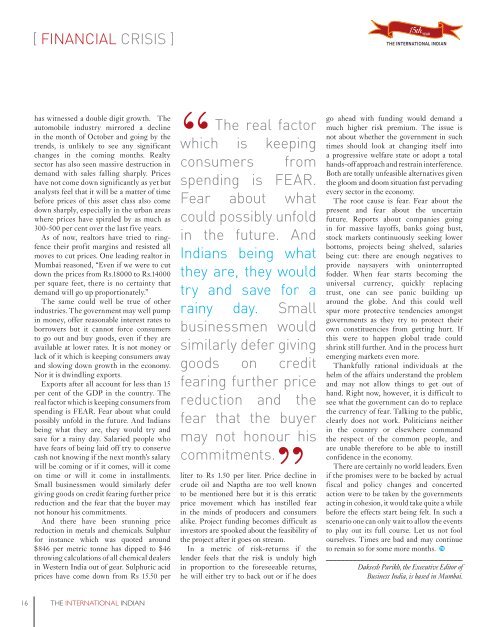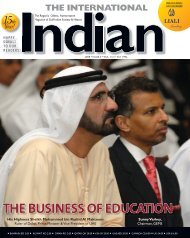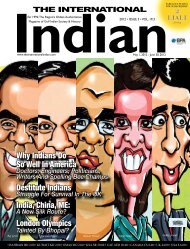THE INTERNATIONAL - International Indian
THE INTERNATIONAL - International Indian
THE INTERNATIONAL - International Indian
Create successful ePaper yourself
Turn your PDF publications into a flip-book with our unique Google optimized e-Paper software.
[ FINANCIAL CRISIS ]<br />
has witnessed a double digit growth. The<br />
automobile industry mirrored a decline<br />
in the month of October and going by the<br />
trends, is unlikely to see any significant<br />
changes in the coming months. Realty<br />
sector has also seen massive destruction in<br />
demand with sales falling sharply. Prices<br />
have not come down significantly as yet but<br />
analysts feel that it will be a matter of time<br />
before prices of this asset class also come<br />
down sharply, especially in the urban areas<br />
where prices have spiraled by as much as<br />
300-500 per cent over the last five years.<br />
As of now, realtors have tried to ringfence<br />
their profit margins and resisted all<br />
moves to cut prices. One leading realtor in<br />
Mumbai reasoned, “Even if we were to cut<br />
down the prices from Rs.18000 to Rs.14000<br />
per square feet, there is no certainty that<br />
demand will go up proportionately.”<br />
The same could well be true of other<br />
industries. The government may well pump<br />
in money, offer reasonable interest rates to<br />
borrowers but it cannot force consumers<br />
to go out and buy goods, even if they are<br />
available at lower rates. It is not money or<br />
lack of it which is keeping consumers away<br />
and slowing down growth in the economy.<br />
Nor it is dwindling exports.<br />
Exports after all account for less than 15<br />
per cent of the GDP in the country. The<br />
real factor which is keeping consumers from<br />
spending is FEAR. Fear about what could<br />
possibly unfold in the future. And <strong>Indian</strong>s<br />
being what they are, they would try and<br />
save for a rainy day. Salaried people who<br />
have fears of being laid off try to conserve<br />
cash not knowing if the next month’s salary<br />
will be coming or if it comes, will it come<br />
on time or will it come in installments.<br />
Small businessmen would similarly defer<br />
giving goods on credit fearing further price<br />
reduction and the fear that the buyer may<br />
not honour his commitments.<br />
And there have been stunning price<br />
reduction in metals and chemicals. Sulphur<br />
for instance which was quoted around<br />
$846 per metric tonne has dipped to $46<br />
throwing calculations of all chemical dealers<br />
in Western India out of gear. Sulphuric acid<br />
prices have come down from Rs 15.50 per<br />
“<br />
The real factor<br />
which is keeping<br />
consumers from<br />
spending is FEAR.<br />
Fear about what<br />
could possibly unfold<br />
in the future. And<br />
<strong>Indian</strong>s being what<br />
they are, they would<br />
try and save for a<br />
rainy day. Small<br />
businessmen would<br />
similarly defer giving<br />
goods on credit<br />
fearing further price<br />
reduction and the<br />
fear that the buyer<br />
may not honour his<br />
commitments.<br />
”<br />
liter to Rs 1.50 per liter. Price decline in<br />
crude oil and Naptha are too well known<br />
to be mentioned here but it is this erratic<br />
price movement which has instilled fear<br />
in the minds of producers and consumers<br />
alike. Project funding becomes difficult as<br />
investors are spooked about the feasibility of<br />
the project after it goes on stream.<br />
In a metric of risk-returns if the<br />
lender feels that the risk is unduly high<br />
in proportion to the foreseeable returns,<br />
he will either try to back out or if he does<br />
go ahead with funding would demand a<br />
much higher risk premium. The issue is<br />
not about whether the government in such<br />
times should look at changing itself into<br />
a progressive welfare state or adopt a total<br />
hands-off approach and restrain interference.<br />
Both are totally unfeasible alternatives given<br />
the gloom and doom situation fast pervading<br />
every sector in the economy.<br />
The root cause is fear. Fear about the<br />
present and fear about the uncertain<br />
future. Reports about companies going<br />
in for massive layoffs, banks going bust,<br />
stock markets continuously seeking lower<br />
bottoms, projects being shelved, salaries<br />
being cut: there are enough negatives to<br />
provide naysayers with uninterrupted<br />
fodder. When fear starts becoming the<br />
universal currency, quickly replacing<br />
trust, one can see panic building up<br />
around the globe. And this could well<br />
spur more protective tendencies amongst<br />
governments as they try to protect their<br />
own constituencies from getting hurt. If<br />
this were to happen global trade could<br />
shrink still further. And in the process hurt<br />
emerging markets even more.<br />
Thankfully rational individuals at the<br />
helm of the affairs understand the problem<br />
and may not allow things to get out of<br />
hand. Right now, however, it is difficult to<br />
see what the government can do to replace<br />
the currency of fear. Talking to the public,<br />
clearly does not work. Politicians neither<br />
in the country or elsewhere command<br />
the respect of the common people, and<br />
are unable therefore to be able to instill<br />
confidence in the economy.<br />
There are certainly no world leaders. Even<br />
if the promises were to be backed by actual<br />
fiscal and policy changes and concerted<br />
action were to be taken by the governments<br />
acting in cohesion, it would take quite a while<br />
before the effects start being felt. In such a<br />
scenario one can only wait to allow the events<br />
to play out its full course. Let us not fool<br />
ourselves. Times are bad and may continue<br />
to remain so for some more months.<br />
Daksesh Parikh, the Executive Editor of<br />
Business India, is based in Mumbai.<br />
16<br />
<strong>THE</strong> <strong>INTERNATIONAL</strong> INDIAN
















